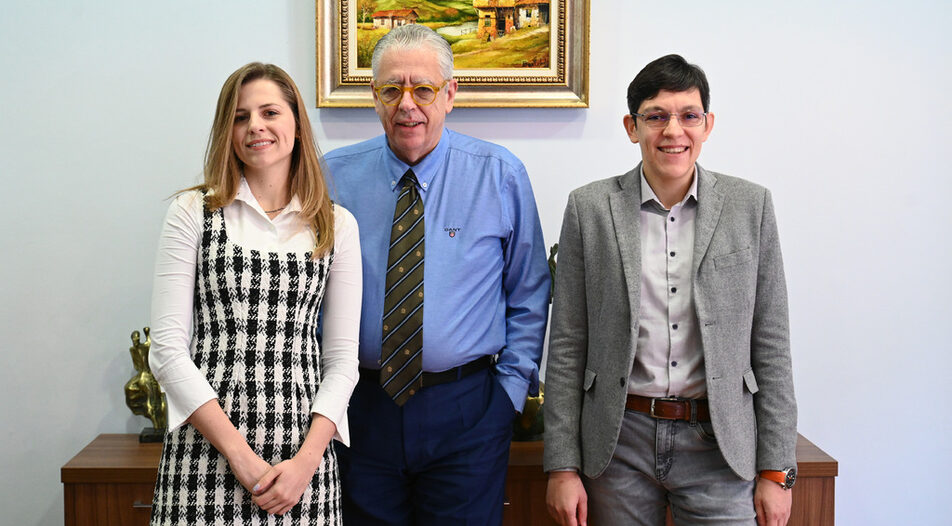Thanos Petropoulos is a Partner and Managing Director at Mazars Bulgaria with a long experience as a banking executive abroad and in Bulgaria.
Kristina Stefanova is a Manager in Mazars' Sustainability Department and leads the business line serving financial institutions and large industry leaders. She is currently part of several initiatives related to the development of social impact assessment, carbon performance and sustainable supply chain services.
Mityo Georgiev is part of Mazars Bulgaria's audit team. His main focus is auditing international insurance companies. In 2023 he was part of the Public Oversight Commission's working group on registered auditors, which oversees the transposition of the CSRD in Bulgaria.
Why does the EU need CSRD (the corporate sustainability reporting directive) and what are the concrete objectives of its implementation?
Kristina Stefanova (KS): The idea of NFRD (the old Non-Financial Disclosure Directive), was to impose non-financial information reporting in the EU for Public Interest Enterprises (PIEs)- listed companies, financial institutions and insurance companies. But out of 27 member states, only 3 imposed a mandatory non-financial audit under this directive, leading to the companies reporting information that was not subject to any verification and the directive being maneuvered.
Does this means that it was not effective at all?
Mityo Georgiev (MG): Too broad and non-specific and, in reality, the companies did not bear any responsibility for the information they presented in their non-financial reports. It certainly wasn't enough for the purposes sought in the EU.
What will change with the new directive in that case? How is it going to tackle the issues with the old one?
KS: Many things. From 10,000 companies, the scope will grow to nearly 50,000, of which 500-600 are based in Bulgaria. The directive will be implemented in several phases. In the first, under the scope are the companies that were also subject to NFRD - public interest companies (banks, insurers) with more than 500 employees. They will be subject to the new sustainable standards (European sustainability reporting standards) from 2024 and will have to publish their first report in 2025.
The second phase is for large non-public interest companies that are due to report for the 2025 financial year and will publish their sustainability reports in 2026.
We should mention that you generally have to meet 2 of the 3 criteria to be subjected by the directive: assets worth €20 million, revenues worth €40 million or over 250 staff.
There is also a third group of listed small and medium-sized enterprises (SMEs), but which are not micro. They will have to report information from the 2026 financial year onwards.
There is also a category for companies or groups that are not of European origin and generate more than 150 million euros of turnover in the EU. They must also have at least one subsidiary (large enterprise or registered SME) or one branch located in the EU. (In the case of a branch, it must generate more than 40 million euros of turnover in the EU.)
What does sustainable auditing (non-financial) mean anyway? Who will execute it and what will be focused on?
KS: Firstly, the sustainable audit will be carried out partially until 2029, only subsequently will it be executed as the financial audit today.
The directive gives several viable options in choosing the auditor- from companies that may not even be engaged in auditing to financial consultants or even third parties. There is also the option of a joint audit of non-financial data for public interest companies, as it is in the financial audit.
This is still to be decided in Bulgaria.
When is it going to be decided?
MG: Currently there is a working group at CPOSA (Commission for Public Oversight of Registered Auditors) whose task is to transpose the directive into the country's legislation.
It must be decided by early July 2024 (18 months after the introduction of the directive -on 5 January 2023).
What institution is going to certify the sustainable auditors? Who is going to be the regulator?Thanos Petropoulos (TP): There is a deadline for transposing the directive imposed by Brussels, which is July 4 next year. In just 18 months from January this year we will find out what will happen in the country.
The final versions of the sustainable development standards are still to be approved, which, like the international financial standards, will lay down the requirements.
As we have already mentioned the new standards, they will practically be the equivalent of the financial standards, but for non-financial information?
MG: Yes, they will be a continuation of IFRS (international financial reporting standards), an extension to the existing standards and will carry the same weight.
It is very important to note that there will be more than 1,000 required types of data disclosures that companies will have to provide. Which means that business must be ready for large-scale reporting control.
How should the Bulgarian business prepare?
KS: No one is prepared at the moment and it would be difficult if the company does not have western know-how to depend on. The standards will require well-trained teams especially aware of ESG standards. The new directive actually obliges almost everyone in the corporate structure to be aware of the changes - from marketing to the finance department.
At first glance, the main thing to do is to analyze the double materiality according to the new standards, to what extent it falls under the scope and whether the business is technically intact.
Is Mazars already preparing their clients for the new changes that are coming soon?
TP: Yes, and we are also preparing offers for new ESG customers. The market is currently open to both financial and non-financial companies.
How many players providing ESG audits are there in the market right now?
MG: That's a good question. We know about the big audit firms - the Big Four plus a few more. There are also several other companies that are smaller, but are noticeable in the market.
What does business think about all the ESG innovations?
TP: Our impression is that business is not prepared. And those who are not aware also have a serious concern about the price, precisely because they do not know what to expect.
But since Brussels is betting a lot on this directive, companies should have one thing in mind and not count on the fact that the Bulgarian parliament can postpone the changes forever and that they will come later than in the rest of the EU countries.
Let's consider you are managing a coal plant, how do you cope with the green standards?
KS: Calculating emissions is only one part of the process. According to the taxonomy, the classification of whether a company is engaged in green activity is defined in three categories: non-green activity, in transition, and fully green development activity.
What happens to businesses that cannot become green and sustainable according to the new criteria? We have enough examples of companies with millions of revenue which could face issues in the transition.
TP: This is extremely important, but it has not yet become clear. It is a difficult decision and a slightly delicate subject, one that has to avoid severe limitations to business and even closures.
Will CSRD change the way business is done in Bulgaria in 10 years' time?
TP: Let's see what the sanctions will be for those who do not comply with the new requirements and we will find out. But it will certainly change the way big business is done.
Usually in Bulgaria we import the changes from abroad and it will probably be the same this time as well.
KS: But we should not associate the changes only with fines and negativity, because new sustainable companies will emerge on the market and will be able to receive financing and develop with an advantage over larger and more inflexible companies who cannot adapt. For example, financial institutions are expected to provide more favorable financing conditions to those with a good ESG rating.
Therefore, perhaps this conversation should not only serve as an alarm, but also as an opportunity.
Thanos Petropoulos is a Partner and Managing Director at Mazars Bulgaria with a long experience as a banking executive abroad and in Bulgaria.
Kristina Stefanova is a Manager in Mazars' Sustainability Department and leads the business line serving financial institutions and large industry leaders. She is currently part of several initiatives related to the development of social impact assessment, carbon performance and sustainable supply chain services.
Mityo Georgiev is part of Mazars Bulgaria's audit team. His main focus is auditing international insurance companies. In 2023 he was part of the Public Oversight Commission's working group on registered auditors, which oversees the transposition of the CSRD in Bulgaria.












